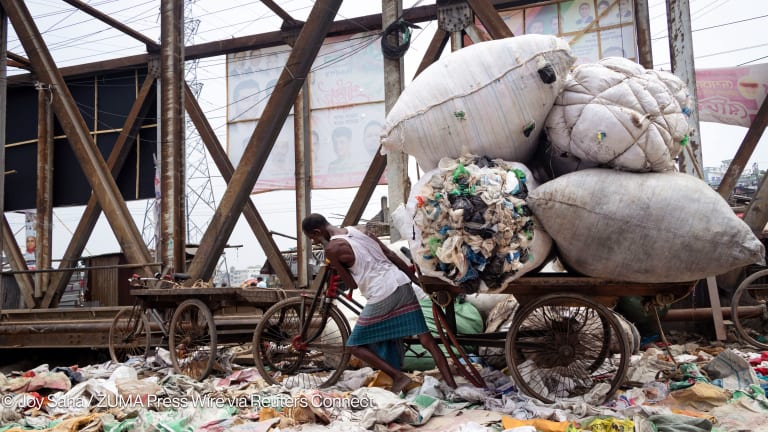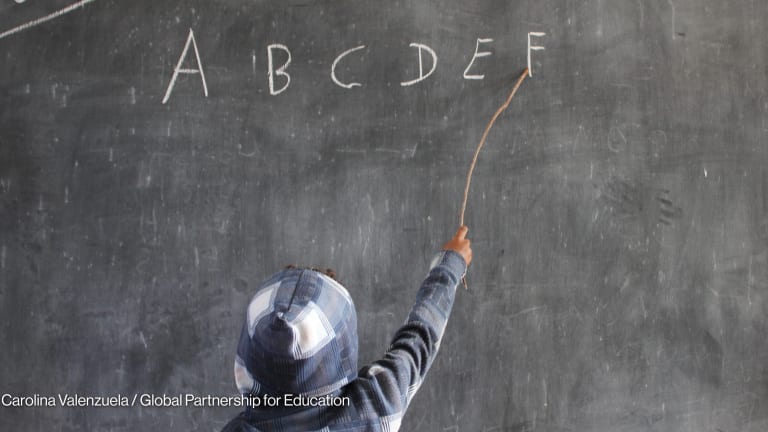
For post COVID-19 economic recovery to be green and equitable, international consensus and cooperation are essential. The global transition to a circular economy can unlock new sustainable economic opportunities, but will require trillions in investments, including for low- and middle-income countries.
A “Global Repairation Fund” that provides investments and financing to local governments, worker co-ops, and social entrepreneurs for circular solutions such as repair, recycling, and remanufacturing initiatives around the world could play a pivotal role in tackling the global waste crisis. It could also help reduce greenhouse gas emissions stemming from resources and materials use, while also helping fight poverty and hunger in low- and middle-income countries.
Investing in skills, capacity, and jobs
Global resource extraction, land-use changes, processing of materials, and manufactured goods account for about 45% of global carbon emissions. A solution for reducing the impact from resource consumption and waste is to shift from a take-make-dispose model to a circular economy that conserves resources, maximizes value, and retains the use-life of materials as long as possible.
The division of labor in manufacturing, consumption, and disposal has a global geography with many environmental and social externalities that are unequally distributed across value chains. While most manufacturing and disposal takes place in low- and middle-income countries, the use-life and benefits are accrued in wealthier countries. This global inequality in production-consumption-disposal patterns is not only an issue of injustice, but also complicates efforts to close material loops within national borders.
Most resource recovery, repair, and recycling activities take place in the informal economy in Asia, Africa, and Latin America. Millions of informal workers have long provided an invisible subsidy for waste management, recycling, and repair, at cost to their own health and social mobility.
The countries and companies that are responsible for generating that waste could provide the funds that would be managed by an international body and governed by a range of representatives.
—The informal economy operates in the shadows, gaining access to resources only after they are discarded as waste. Informal work often entails hazardous and exploitative working conditions. The cheap, low-tech processes of repair and remanufacturing are sometimes environmentally hazardous, and operate outside regulatory processes.
Our research shows that lack of access to credit and commercial finance is one of the biggest barriers preventing informal organizations from participating in value-adding circular economy repair and remanufacturing activities. As long as informal recyclers and waste pickers lack access to finance to improve operations and equipment, work conditions cannot improve and resource recovery will be marginal.
A Global Repairation Fund could provide investments and financing for repair, recycling, and remanufacturing initiatives around the world, especially informal sector initiatives in the global south. It is an opportunity to accelerate the just transition to a circular economy and lift informal work out of the shadows.
The ethical basis of this proposed fund is based around principles of environmental justice and human development needs. Funding is a means of recognizing and compensating this labor, as well as providing up-skilling and capacity building for millions of workers.
A circular approach to infrastructure funding
The economic rationale for such a global fund is to move beyond hazardous recycling to create markets and businesses for higher value economic activities — particularly remanufacturing and repurposing models. A Global Repairation Fund could support such market development and new trade opportunities by investing in infrastructure to “close the loop” on resources and waste.
It is also necessary and possible to reduce the need for finite materials in infrastructure through better and more efficient design, planning, and the delivery of infrastructure. To reduce the environmental and climate impact from infrastructure, the Global Infrastructure Hub — a G-20 Initiative — has recommended ramping up international collaboration to support the funding and financing of circular infrastructure opportunities.
Several ad-hoc initiatives already exist that connect development organizations, multinational corporations, and the informal economy. This particular fund, however, would help systematize and synergize these disparate initiatives.
For example, a UNDP-Coca Cola Hindustan partnership has set up aggregation centers equipped with low-density polyethylene machines that convert unusable plastics into usable raw materials for plastic remanufacturing. In Bengaluru, they partner with Hasiru Dala, a waste picker cooperative, supporting waste pickers in producing value-adding materials and increasing their incomes.
New funding sources are emerging
Several European countries have enacted stringent extended producer responsibility (EPR) regulations that shift financial responsibility for dealing with the end-of-life of products to companies, especially electronic waste. Setting up recycling, remanufacturing and repair processes in wealthy countries, however, has proven to be slow and often cost-prohibitive. As much as 50 million tonnes of electronic waste is currently produced each year — the majority of it shipped to low-income countries.
How major economies are funding 'carbon lock-in' abroad
The three largest economies' overseas financing has led to 233 gigawatts in new power capacity since 2005, with the overwhelming majority relying on fossil fuels.
Current cooperation programs on waste and recycling number in the millions, and unlocking new business opportunities in the circular economy to tackle the global waste and pollution crisis will require billions — even trillions — in investments over the next decade. The countries and companies that are responsible for generating that waste could provide the funds that would be managed by an international body and governed by a range of representatives from governments, civil society, and business.
Contributing to a global reparation fund is not just the right thing to do for companies, but also becomes necessary when countries, such as China and India, who have historically allowed imports of waste now refuse to carry this environmental burden without compensation. The fund could be a means of enacting national EPR regulations and commitments in a manner that is consistent with actually existing global flows of resources and waste.
The idea could also gain momentum in the U.S., as Biden recently signed an executive order to support consumers’ “right to repair.” Extending the right to repair internationally and ensuring access to spare parts, including subsidizing expensive parts of important equipment such as medical devices, could be part of the fund’s mandate. Furthermore, the B3W initiative announced by the G-7 is exploring opportunities to apply circular economy principles in infrastructure development.
Finally, the fund should also provide reparation/compensation payments to communities that have been affected badly by waste and pollution from the linear model, e.g. polluted farmland or communities living near waste dumps — similar to the Adaptation Fund under the U.N. Framework Convention on Climate Change.
The Paris Agreement goals emphasize the need to mobilize public and private sector finance to support climate mitigation and adaptation. Looking ahead to the COP 26 in Glasgow, this is the right moment to finance systemic solutions to address global justice concerns and reduce emissions, resource use, and waste.









